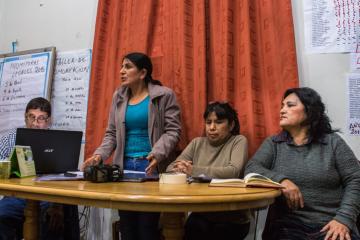
Expanding government partnerships in Brazil and Mexico for evidence-informed policy

This year, J-PAL is celebrating two decades of improving lives through evidence. The anniversary reinforces our commitment to reducing poverty by ensuring that policy is informed by scientific evidence. It is a year to continue building solid, long-term relationships with governments in Latin America and the Caribbean (LAC) for generating and applying evidence. We will bolster our efforts to collaborate with the governments of Brazil and Mexico—the two biggest countries in LAC and accounting for over half of the region’s population.
In this blog post, we highlight some examples of our policy partnership experiences and announce a selection process to engage with new governments in Brazil and Mexico.
Improving lives through government partnerships with J-PAL LAC
Over the years, we have collaborated with numerous governments across multiple sectors, such as gender, labor, education, and social protection. These partnerships have resulted in impactful innovations. An excellent example of what evidence use can achieve is MineduLAB, a government innovation from our partnership with the Peruvian Ministry of Education and Innovations for Poverty Action. The lab is a dedicated unit inside the ministry to identify, test, and scale low-cost interventions to improve educational outcomes. Some other examples include massive trainings for civil servants in Brazil, in collaboration with the Brazilian National School of Public Administration, and fostering the design of evidence-based policies in education. These partnerships have helped to build a culture of data and evidence use in LAC governments.
Our experience in our region allows us to deliver fast and effective support to our partners. We offer training and courses to strengthen civil servants’ knowledge of evidence use for decision-making, we connect researchers to help governments answer policy-relevant questions, and we share evidence tailored to the problems that policymakers face. Our responsiveness proved especially relevant during the Covid-19 pandemic when we supported the decision-making of governments in the region.
These examples show how the joint work between governments and J-PAL can change how policy is made. Read more about those collaborations and what we have learned on the way in the report “Creating a Culture of Evidence Use: Lessons from the J-PAL's Government Partnerships in Latin America.”
Expanding government partnerships in Brazil and Mexico while promoting gender equity
Thanks to the support of Co-Impact and Community Jameel, we will significantly expand our evidence-to-policy government partnerships in Brazil and Mexico. These partnerships will support governments we have not worked with before in laying the groundwork to take evidence-informed policies and programs to scale, aiming to improve the lives of people affected by poverty. Through these partnerships, local, regional, and national government organizations will enhance their capacities to generate and use evidence and data while incentivizing evidence-based policymaking to reduce gender inequality.
Throughout 2023, we are carrying out a process to identify government institutions interested in using evidence in their work and decision-making. The process starts with a government applying for training. After a selection process, their representatives participate in several training sessions on randomized evaluations, how to use evidence, and applying a gender perspective to policymaking, organizations well-suited to start a government partnership will be put in contact with researchers from the J-PAL’s network for potential collaborations. At this point, governments and researchers can submit a joint letter of interest explaining how they will work to reduce the gender gap, the main anticipated challenges, and how a partnership with J-PAL can help overcome them. After reviewing these letters, a selection committee will choose the teams that will participate in a new partnership.
See more details of the standard process for selecting institutions for government partnerships.
Why should governments go through the partnership selection process?
The road to building a culture of evidence can be long and demanding. Our role is to make this path less burdensome for governments. We will build on our twenty years of experience to support institutions diagnose problems and identify promising and innovative solutions that can improve lives and reduce gender inequalities in the region. We understand that it is essential to recognize the possibilities and constraints of each government, as well as what they look for in a partnership with J-PAL.
Depending on the organization's needs, we can support governments by strengthening their knowledge around evaluations and their use, institutionalizing the use of data and evidence in public policy decision-making, and/or providing technical support in the design and development of ongoing or potential programs. Find out examples of how we have supported governments in the past.
Government organizations are welcome to participate in the free online information sessions to learn more about J-PAL and the selection process. There will be separate sessions for the Mexican and Brazilian governments in February and March, respectively. If you have questions, please contact Vianney Fernández ([email protected]) for partnerships in Mexico and Ariana Britto ([email protected]) for partnerships in Brazil.
Interested in learning more? Check out J-PAL LAC's upcoming webinars:
- Primer ciclo de alianzas con gobiernos en México: ¿Cómo participar? – February 23 from 12:00 to 1:00 pm CST (This event will be held in Spanish).
- Primeiro ciclo de parcerias com governos no Brasil: Como participar? – April 11 from 4:00 to 5:00 pm BRT (This event will be held in Portuguese).




